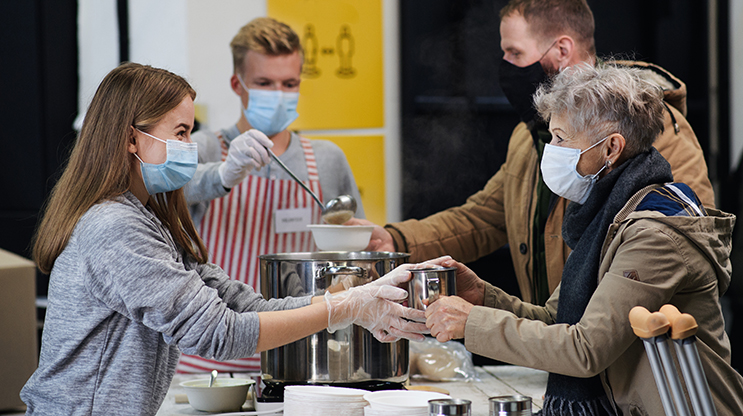Despite the pandemic, volunteers—who work every day in community agencies or directly with Centraide of Greater Montreal—have continued to show up to help. Providing essential services to vulnerable groups through our network has been a true challenge; however, our volunteers have been more dedicated than ever.
Preparing meals for the homeless, staying in touch with isolated seniors, and providing educational support are just a few examples of the help they provide every day. Despite their tremendous commitment, their task has not been easy since the pandemic started.
When life gets turned upside down
More than a year after the health crisis began, volunteer activities run by community agencies are still severely disrupted to varying degrees. To protect staff, volunteers, the people they help and, to a larger degree, society in general, in-person activities have had to be suspended due to prevailing health restrictions. Agencies also experienced a significant drop in senior volunteers. As just one example, volunteer action centres (CAB) have lost 80% of their volunteers. [1].
Paradoxically, this same period has seen an outpouring of enthusiasm for volunteering from the public. Following the call from the Premier of Quebec, JeBénévole.ca, the platform that matches people with volunteering opportunities, received over 40,000 applications. Given such a large influx of new faces, community agencies have lacked the tools to train and supervise these new helpers. However, they have managed to successfully adapt to this new reality.
Rethinking old practices
Agencies still have challenges to address, such as shifting away from 9-to-5 volunteer activities, which can be difficult if not impossible for many workers, or even making volunteer positions more flexible to fit with people’s different realities.
Needs will not decrease after COVID-19. According to a survey conducted on the JeBenevole.ca platform, 93% of people who signed up intend to keep volunteering after the health crisis. This is great news given that retention was already a major challenge in the volunteer sector, and one that has been brought to the forefront especially during the health crisis.
Volunteering can involve different areas of action and require a range of skills, and people from all walks of life can help out in varied ways. The main challenge is to maintain our social fabric and continue to provide essential services to our community’s most vulnerable people, a fight that has needed great ingenuity from community stakeholders in the Greater Montreal area.
Most people who have signed up on the JeBenevole.ca platform are between the ages of 40 and 60.
The main challenge is to maintain our social fabric and continue to provide essential services to our community’s most vulnerable people, a fight that has needed great ingenuity from community stakeholders in the Greater Montreal area.



